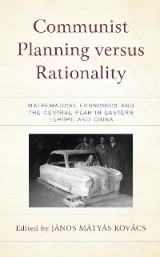Details

Communist Planning versus Rationality
Mathematical Economics and the Central Plan in Eastern Europe and ChinaRevisiting Communism: Collectivist Economic and Political Thought in Historical Perspective
|
48,99 € |
|
| Verlag: | Lexington Books |
| Format: | EPUB |
| Veröffentl.: | 14.04.2022 |
| ISBN/EAN: | 9781793631787 |
| Sprache: | englisch |
| Anzahl Seiten: | 424 |
DRM-geschütztes eBook, Sie benötigen z.B. Adobe Digital Editions und eine Adobe ID zum Lesen.
Beschreibungen
<p><span>This volume examines concepts of central planning, a cornerstone of political economy in Soviet-type societies. It revolves around the theory of “optimal planning” which promised a profound modernization of Stalinist-style verbal planning. Encouraged by cybernetic dreams in the 1950s and supporting the strategic goals of communist leaders in the Cold War, optimal planners offered the ruling elites a panacea for the recurrent crises of the planned economy. Simultaneously, their planning projects conveyed the pride of rational management and scientific superiority over the West. The authors trace the rise and fall of the research program in the communist era in eight countries of Eastern Europe, including the Soviet Union, and China, describing why the mission of optimization was doomed to fail and why the failure was nevertheless very slow. The theorists of optimal planning contributed to the rehabilitation of mathematical culture in economic research in the communist countries, and thus, to a neoclassical turn in economics all over the ex-communist world). However, because they have not rejected optimal planning as “computopia,” there is a large space left behind for future generations to experiment with Big Optimal Plans anew—based, at this time, on artificial intelligence and machine learning.</span></p>
<p><span>This volume examines failed attempts at modernizing the communist economy by means of optimal planning. It traces the rise and fall of the concept in Eastern Europe and China, explaining why the mission of optimization was doomed to fail and why it may nevertheless be relaunched today. </span></p>
<p><span>Introduction: Another “Grand Illusion” – Optimizing the Central Plan</span></p>
<p><span>Chapter One: To Command or to Understand? Planning Concepts and Economic Research in Communist Bulgaria</span></p>
<p><span>Chapter Two: Quantitative Economics in China. From Planned Economy to Socialist Market Economy</span></p>
<p><span>Chapter Three: Mathematical Economics and Central Planning. Economic Research in Czechoslovakia under Communism</span></p>
<p><span>Chapter Four: Theory and Political Economy of Central Planning in East Germany</span></p>
<p><span>Chapter Five: Mathematical Economics outside the Neoclassical Paradigm? Evolution of Planning Concepts in Hungary under Communism</span></p>
<p><span>Chapter 6: Between Rationality and Reality. Economics and Central Planning in Poland (1945–1989)</span></p>
<p><span>Chapter Seven: The Failure of Communist Planning: A Perspective from Romania</span></p>
<p><span>Chapter Eight: Communism = Soviet Power + Planning. Planning and Mathematical Economics in the Soviet Union</span></p>
<p><span>Chapter Nine: Mathematical Economics, Economic Modeling, and Planning in Yugoslavia</span></p>
<p><span>Conclusion: Rationality Found and Lost? In Search of a New Historical Narrative of Optimal Planning</span></p>
<p></p>
<p><span>Chapter One: To Command or to Understand? Planning Concepts and Economic Research in Communist Bulgaria</span></p>
<p><span>Chapter Two: Quantitative Economics in China. From Planned Economy to Socialist Market Economy</span></p>
<p><span>Chapter Three: Mathematical Economics and Central Planning. Economic Research in Czechoslovakia under Communism</span></p>
<p><span>Chapter Four: Theory and Political Economy of Central Planning in East Germany</span></p>
<p><span>Chapter Five: Mathematical Economics outside the Neoclassical Paradigm? Evolution of Planning Concepts in Hungary under Communism</span></p>
<p><span>Chapter 6: Between Rationality and Reality. Economics and Central Planning in Poland (1945–1989)</span></p>
<p><span>Chapter Seven: The Failure of Communist Planning: A Perspective from Romania</span></p>
<p><span>Chapter Eight: Communism = Soviet Power + Planning. Planning and Mathematical Economics in the Soviet Union</span></p>
<p><span>Chapter Nine: Mathematical Economics, Economic Modeling, and Planning in Yugoslavia</span></p>
<p><span>Conclusion: Rationality Found and Lost? In Search of a New Historical Narrative of Optimal Planning</span></p>
<p></p>
<p><span>János Mátyás Kovács</span><span> is honorary professor at Eötvös Lorand University, senior member at Research Center for the History of Transformations (RECET) at University of Vienna, permanent fellow emeritus at Institute for Human Sciences, and visiting professor at Central European University.</span></p>

















